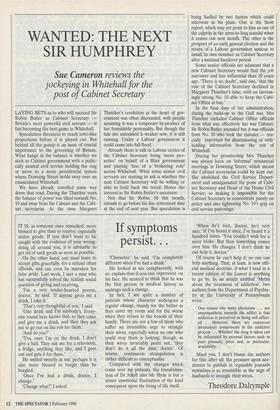If symptoms
persist.. .
IT IS, as someone once remarked, more blessed to give than to receive: especially stolen goods. If you don't want to be caught with the evidence of your wrong- doing all around you, it is advisable to get rid of such goods as soon as possible.
On the other hand, one must learn to accept gifts gracefully, for a refusal often offends, and can even be mistaken for false pride. Last week, I met a man who has successfully solved the ticklish social question of giving and receiving.
`I'm a very tender-hearted person, doctor,' he said. 'If anyone gives me a drink, I take it.'
`That's very thoughtful of you,' I said.
`One drink and I'm anybody's. Every- one round here knows that, so they come and give me a drink, and then they ask me to go out on the rob for them.'
`And do you?'
`Yes, once I'm on the drink, I don't give a hell. They ask me for a television, a fridge, anything they like, and I goes out and gets it for them.'
He smiled sweetly at me: perhaps it is also more blessed to burgle than be burgled.
`Once I've had a drink, doctor, I change.'
`Change what?' I asked. `Character,' he said. 'I'm completely different when I've had a drink.'
He looked at me complacently, with an explain-that-if-you-can expression on his face. He seemed to think that he was the first person in medical history to undergo such a change.
In fact, I see quite a number of patients whose character undergoes a regular change, mainly for the better as they enter my room and for the worse when they return to the bosom of their family. There are not a few of them who suffer an irresistible urge to strangle their wives, especially when no one who could stop them is looking: though, as their wives invariably point out, 'they don't do it all the time, doctor'. Of course, continuous strangulation is rather difficult to conceptualise.
Compared with the changes which come over my patients, the transforma- tion of Dr Jekyll into Mr Hyde is but a minor emotional fluctuation of the kind consequent upon the living of life itself. `When he's nice, doctor, he's very nice.' If I've heard it once, I've heard it a hundred times. 'You couldn't wish for a nicer bloke. But then something comes over him. He changes. I don't think he can help it, doctor.'
Of course he can't help it: no one can help anything. That, at least, is now offi- cial medical doctrine, if what I read in a recent edition of the Lancet is anything to go by. In an article entitled 'Myths about the treatment of addiction', two authors from the Department of Psychia- try at the University of Pennsylvania write:
One reason why many physicians ... are unsympathetic towards the addict is that addiction is perceived as being self-afflict- ed ... However, there are numerous involuntary components in the addictive process . . . Whether the drug is taken can be influenced by external factors such as peer pressure, price and, in particular, availability.
Mind you, I don't blame the authors for this: after all, the pressure upon aca- demics to publish in reputable journals nowadays is as irresistible as the urge of husbands to strangle their wives.
Theodore Dalrymple


































































 Previous page
Previous page